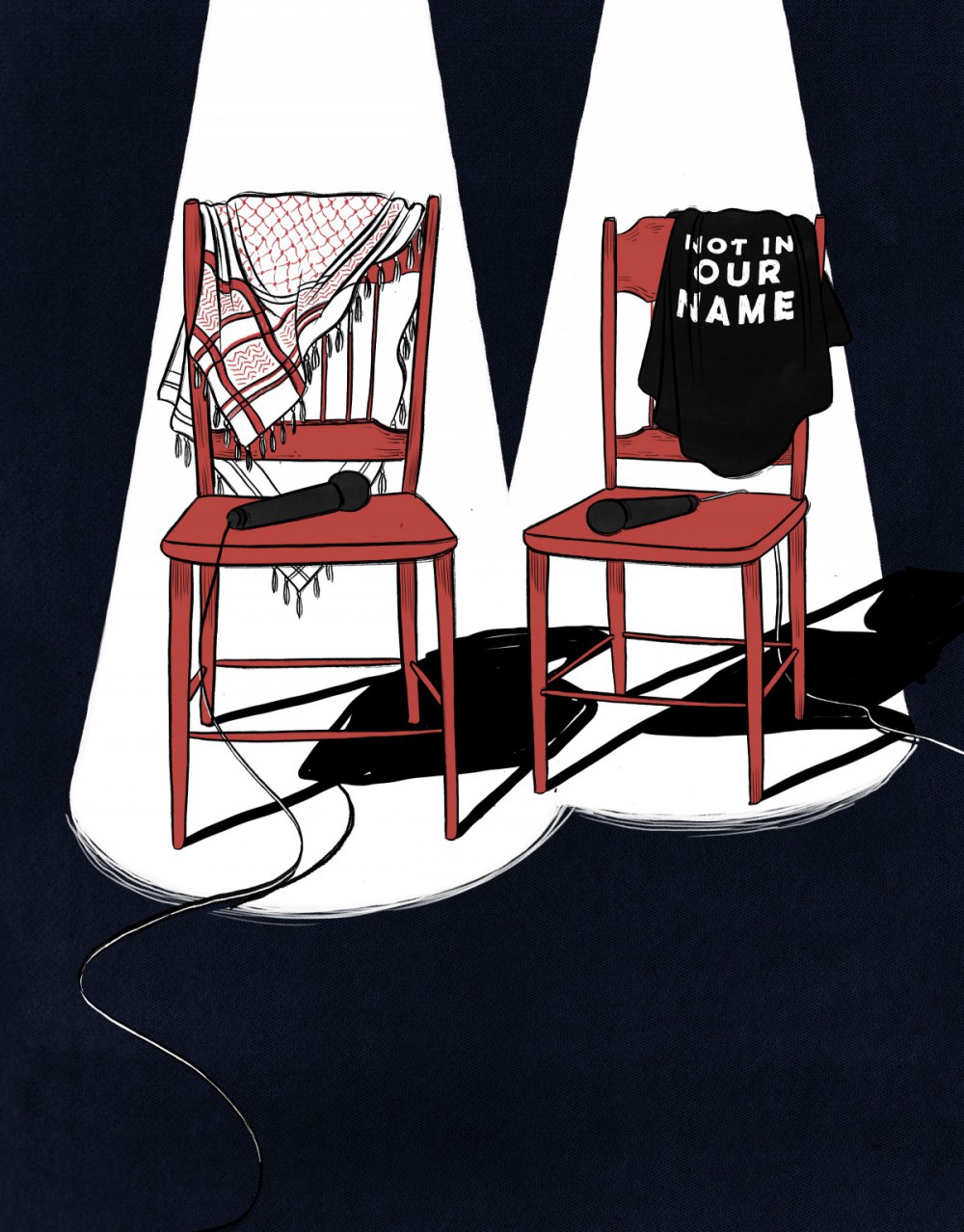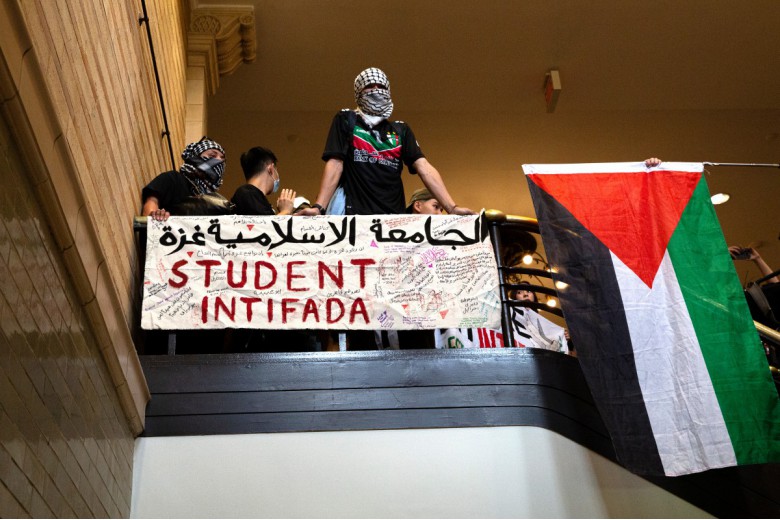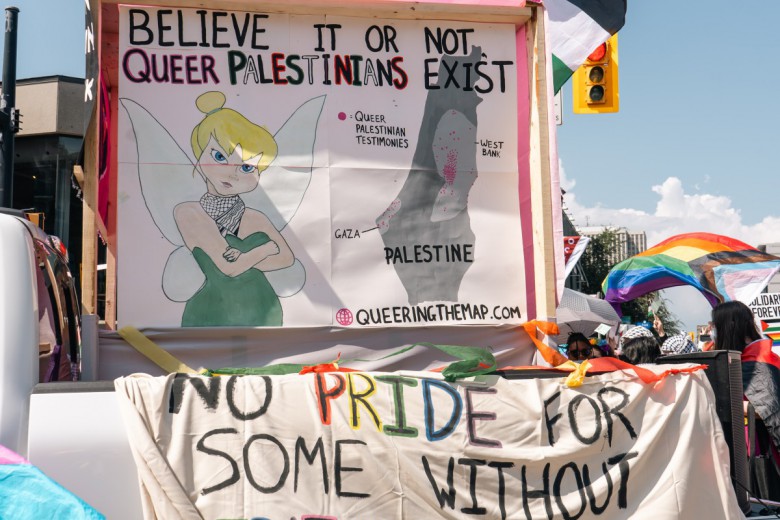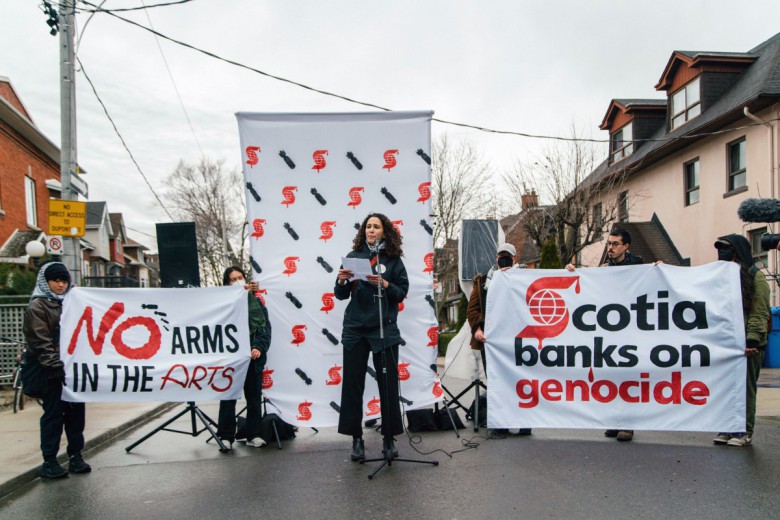
Lee Lai
In May 2025, the night before Toronto city council voted in a “protest bubble” bylaw, two Israeli Embassy staff members were murdered coming out of the Capital Jewish Museum in Washington, D.C. The shooting and the bylaw came on the heels of several gun incidents around Toronto since Israel’s relentless bombing campaign and genocide began in response to the Hamas attack of October 7, 2023. According to Zionist organizations like B’nai Brith and Hillel, Jew hatred is on the rise and reaching catastrophic levels, and they are using the shooting as cover to continue their conflation of antisemitism with anti-Zionism. Many watching in horror as Israel systematically decimates the population of Gaza are understandably embittered at the hypocrisy of being asked to find compassion for the murders of these two embassy staff less than two weeks after the United Nations predicted the imminent and intentional starvation of over 70,000 Palestinian children in Gaza under the age of five by March 2026.
As intense criminalization and suppression of the pro-Palestine movement is occurring in North America and Europe, “protest bubble” bylaws have been either drafted or introduced in cities across Ontario – like Ottawa, Brampton, and Vaughan – under the guise of curbing antisemitism. Toronto is the latest city to adopt this legislation, which limits protests to be a certain distance away from religious institutions, schools, child-care centres, and other sites in need of extra protection from Jew hatred. In Thornhill and Montreal, protests have been held outside of synagogues that host events for the sale of illegally occupied homes in the West Bank. Despite being attended, and in some cases organized, by Jewish protesters themselves, these demonstrations were deemed antisemitic by mainstream media and politicians. In Thornhill, a Zionist used a nail gun to threaten pro-Palestine demonstrators and was subsequently arrested. This detail seemed to drop from some subsequent retellings of the event.
After nearly two years of live-streamed atrocities in Gaza, the West Bank, and Lebanon, it is hard for me as a Jewish woman to contend with the discourse of antisemitism that continues to be held up as a dire imperative in the face of a genocide.
These were not the only demonstrations in support of Palestinian life deemed unsafe for the Jewish community. Again in Toronto, members of neighbourhood group Eglinton-Lawrence and Don Valley 4 Palestine were arrested and barred from waving Palestinian flags on an area overpass. Again, these actions were portrayed by Jewish groups, city councillors, and police as being directed against the Jewish residents of the neighbourhood and were thus forbidden. But when a Palestine protest followed the typical protest path in Toronto and a single protester climbed on top of a ledge outside of Mount Sinai Hospital to wave a Palestinian flag, this too became an area in need of protection from Jew hatred. Then-prime minister Justin Trudeau condemned the protest as reprehensible and antisemitic. Toronto mayor Olivia Chow accused protesters of targeting Jewish institutions with antisemitism and hate (the hospital is open to patients of all faiths). Meanwhile the front entrance to the hospital is only open until 6 p.m. and had been locked before the march briefly passed by at 8 p.m. No corrections were issued by any politicians.
Weaponizing Judaism
After nearly two years of live-streamed atrocities in Gaza, the West Bank, and Lebanon, it is hard for me as a Jewish woman to contend with the discourse of antisemitism that continues to be held up as a dire imperative in the face of a genocide. I have seen too many murdered and dismembered babies to worry about antisemitism right now. Yes, antisemitism is real and it is a problem. And yet, as I listen to my friends from Gaza list the dozens of family members they have lost, my concern about the genuine antisemitism that exists seems unimportant. At a moment when tens of thousands of Palestinians in Gaza have been murdered in cold blood, why is decrying antisemitism a reasonable response to the chants of “from the river to the sea,” calling for freedom for Palestinians?
As Israel does everything in its power to conflate Jewish identity with the militaristic fascism occurring in Palestine, I wonder if perhaps Israel is not responsible for the new wave of actual antisemitic incidents. Conflating all Jews with the actions of the State of Israel is antisemitic, but that is the exact conflation Israel makes when it argues that any opposition to the actions of the Israeli state constitutes antisemitism. As an anti-Zionist Jew, I’ve spent the past near decade seeking to explain the difference between anti-Zionism and antisemitism. I’ve been part of Jewish organizations that exist to denounce the notion that wanting Palestinian liberation is antisemitic. But over 18 months into a livestreamed genocide, continuing to talk about antisemitism has become deeply problematic.
But as proud as I am of my Jewish heritage and understand how it draws me to activism, I’m no longer certain of the merit of organizing from a Jewish identity. I am calling for a free Palestine as a human who has seen and heard the atrocities happening to other humans.
Zionists claim that any mention of Palestine is an attack on Jewish people – that Jews cannot be safe unless an entire population is exterminated. This is the discourse that most Jews have been fed their entire lives, and many truly believe it. The fear some Jewish people feel in this moment is real, even if the source of the fear is misidentified. And the accusation of antisemitism, no matter how farcical or based in racism and Islamophobia, continues to act as a silver bullet through which any action against Israel is quickly deflected. For cities like Toronto, the threat of possible antisemitism even trumps the actual curtailment of civil rights. I myself am scheduled for court-ordered mediation to understand how my actions caused harm to the local community when I protested a Jewish-owned weapons office that supplies Israel.
This protest included many Jewish protesters and utilized Jewish song and prayer. But as proud as I am of my Jewish heritage and understand how it draws me to activism, I’m no longer certain of the merit of organizing from a Jewish identity. I am calling for a free Palestine as a human who has seen and heard the atrocities happening to other humans. I am demanding the Canadian government enact a two-way arms embargo. I am no longer pleading with Zionist Jews to stop enacting white supremacist tropes of victimhood.
When any group in Canada seeks to discuss the current genocide in Palestine or the 77-year history of oppression that led to this moment, they are accused of “Jew hatred.” With antisemitism lawsuits being launched on unions and universities across Canada, lawfare is used to silence those who dare to speak out against Jewish supremacy.
In order to quell these accusations, many groups feel obligated to present two sides in any discussion on Palestine. As an anti-Zionist Jew, my identity and placement in these conversations helps offer a “balanced” perspective while deplatforming Zionists. As a member of Independent Jewish Voices (IJV), a large part of what I and other members have been doing for years is speaking out publicly about Palestine and correcting the notion that doing so is antisemitic. We work to decouple the notion of Zionism as integral to Judaism and encourage others to speak up without fear of seeming antisemitic. We support those who are punished for their stance on Palestine and assure them that calling for freedom for Palestinians from the river to the sea does not harm the Jewish people.
When Jews are invited to discuss the Holocaust, we are not asked to share the stage with Germans. We don’t ask the Indigenous people of Turtle Island to share the stage with Catholic priests on the National Day for Truth and Reconciliation. None of these events or days are seen as a threat to the existence of Germans or Catholics.
Yet in 2025, the entire discourse on Palestine has changed. No longer is it a fringe issue. No longer can people claim ignorance or believe this is a conflict between two equal sides. Where previous protests were mostly just Arabs and anti-Zionist Jews, today Palestine is a mainstream topic. Even over 18 months into this genocide, mainstream media continues to report on Israel’s vicious actions. Today, many more people know about the oppression of Palestine and the newfound popularity of this topic has allowed for more conversations, panels, and workshops outside of Palestine-focused organizations. I used to fear violent retaliation for displaying a Palestinian flag at my home, but for the last year and a half it has been flying proudly without incident. One neighbour even complimented it. The current popular display of support for Palestine is something I never imagined and is a sharp contrast to the last major attack on Gaza in 2021. Accordingly, the work of IJV has increased tremendously, as well as our invitations to speak about Palestine.
On their own merit
But at a moment when tens of thousands of Palestinians in Gaza have been murdered, I wonder why is it still deemed appropriate to talk about antisemitism in the same breath as Palestine? Despite countless international organizations including Amnesty International naming what is happening in Gaza as genocide, groups like the Centre for Israel and Jewish Affairs insist that any challenging of the state of Israel as a racist endeavor is an attack on the entirety of the Jewish people and therefore antisemitic.
However, speaking alongside Palestinians who are directly impacted every single day by Israeli occupation inadvertently feeds into anti-Palestinian racism. When Jews are invited to discuss the Holocaust, we are not asked to share the stage with Germans. We don’t ask the Indigenous people of Turtle Island to share the stage with Catholic priests on the National Day for Truth and Reconciliation. None of these events or days are seen as a threat to the existence of Germans or Catholics. We could speculate it’s due to Palestinians taking up armed resistance but so did Jews during the Holocaust. Ukrainians, too, took up armed resistance, using Molotov cocktails against Russian forces who invaded in 2022. When even the Geneva Convention acknowledges the legitimacy of armed struggle against occupation, why are Palestinians subject to the double standard?
Jews and Palestinians are put on stage together as though this genocide is a shared experience between us both. Do those experiencing mass slaughter in real time not deserve to have their stories shared on their own merit?
Placing me on stage next to a Palestinian simply by virtue of my Judaism obscures the colonialism and imperialism at the heart of the Zionist entity and instead mischaracterizes the ethnic cleansing of Palestine as a religious conflict that cannot be understood without deference to the genocidal state dropping bombs with impunity. It also delegitimizes the lived experiences of Palestinians, the very thing these panels are actually seeking to uplift. Jews and Palestinians are put on stage together as though this genocide is a shared experience between us both. Do those experiencing mass slaughter in real time not deserve to have their stories shared on their own merit?
My grandma surviving the Holocaust has no actual bearing on what is happening in Gaza. And while it is important to share her story and remember her experiences, it need not be combined with discussions about the current genocide in Palestine. Indeed, there is no shortage of Holocaust museums, remembrance days, or mandatory education. Where are these same considerations for the Nakba or the current genocide in Gaza? I would happily participate in a panel that also includes Palestinians, Kashmiris, Eelam Tamils, and Rwandans, but I have seen no such event in the past 20 months. Just as we need not discuss men’s rights on International Women’s Day, we do not need to discuss the plight of Jews every time we talk about Palestine. Palestine and the lived experiences of Palestinians deserve to stand on their own. Palestinians don’t need me to validate their experiences.
It is everyone’s duty to speak out about Palestine and I will continue to do so every chance I get. When I speak at events on Palestine, I often do so beside Palestinians who are actually personally impacted by this genocide. We speak about the oppressive conditions in Gaza and Palestine both before and after October 7, 2023, and the history and context that led to this moment. Often, we share many of the same points, riffing off each other to explain the current genocide in the context of settler colonialism and imperialism. I am forever honoured by these invitations and fundamentally believe that Jewish people have a role to play in the movement for a free Palestine. And yet I hate giving these talks. I hate centring myself and talking about antisemitism while Palestinian babies are dying every day. I’m sickened at how I insert myself into the narrative while the speaker beside me lists the dozens of family members they have forever lost.
My role here is simple: I am a checkmark that provides “balance” and “two sides” to this conversation. But why does a discussion on genocide require two sides?






